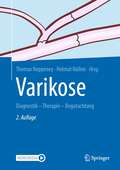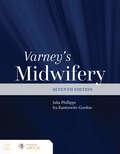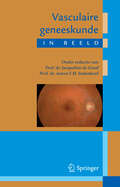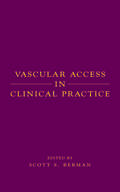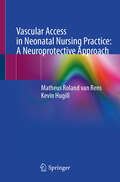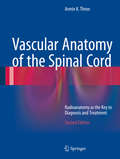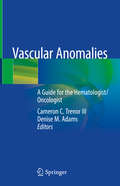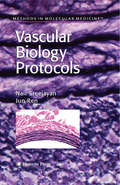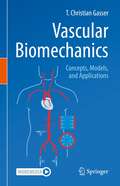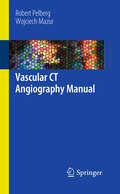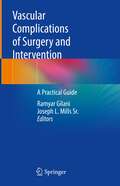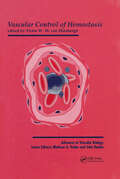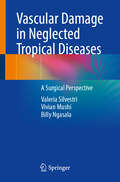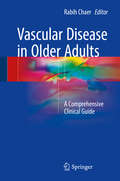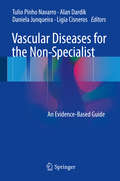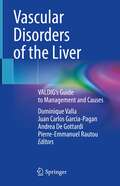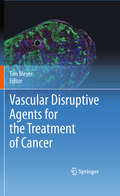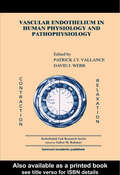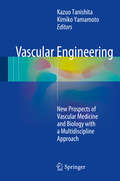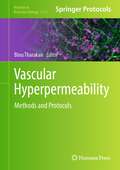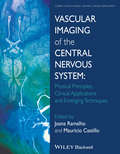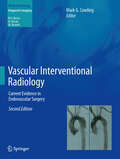- Table View
- List View
Varikose: Diagnostik - Therapie - Begutachtung
by Helmut Nüllen Thomas NoppeneyAllen Ärzten, die Patienten mit Varizen behandeln, gibt dieses durchgehend farbig illustrierte Buch eine präzise und systematische Gesamtdarstellung der Diagnostik und Therapie, wobei das ganze Spektrum der konservativen und operativen Verfahren berücksichtigt wird.Die zahlreichen Methoden werden von den jeweiligen Experten detailliert beschrieben; neben Durchführung und Indikationen sind auch mögliche Komplikationen und bisherige Behandlungsergebnisse berücksichtigt. Ausführlich geht das Buch auf die Klinik der einzelnen Beschwerdebilder und die spezifischen Therapieindikationen ein. Kapitel zu Ätiologie und Pathophysiologie der Varikose sowie zur Begutachtung runden die Darstellung ab. Für die 2. Auflage wurden die Kapitel aktualisiert und teilweise neu verfasst, Beiträge zu neu entwickelten Ablationsverfahren sowie zur Therapie der kutanen Varikose wurden ergänzt.
Varney's Midwifery
by Julia Phillippi Ira Kantrowitz-GordonVarney's Midwifery continues to be the gold standard for midwifery practice in an updated seventh edition. New lead editors assembled a team of expert contributors and authors to continue the legacy of Varney's Midwifery as the trusted, must-have resource for students, professional midwives, and women's health practitioners. Varney's Midwifery uses current evidence-based guidelines to address the care of women throughout the lifespan, including primary care, gynecology, maternity care in a variety of settings, and newborn care. The Seventh Edition reflects the new Core Competencies for Basic Midwifery Practice published in 2020, including care of transgender individuals and abortion-related care. It also provides updated information on chronic conditions in pregnancy including a section discussing COVID-19, new techniques for fetal screening, diagnosis across the lifespan, and updated content on health equity.
Vasculaire geneeskunde in beeld
by Jacqueline De GraafVasculaire geneeskunde in beeld bevat 41 casussen voor huisarts en specialist. Voorzien van full color beeldmateriaal. Iedere casus bevat een vraag met 4 antwoordmogelijkheden. In deel 2 worden de antwoorden uitgebreid toegelicht
Vascular Access in Clinical Practice
by Scott BermanThis comprehensive reference details the techniques for establishing vascular access for hemodialysis and other acute and chronic conditions that require access to the circulation along with peritoneal dialysis access methods. Includes over 960 references and more than 160 tables, figures, and photographs.Vascular Access in Clinical
Vascular Access in Neonatal Nursing Practice: A Neuroprotective Approach
by Matheus Roland van Rens Kevin HugillThis essential resource provides a comprehensive guide for nurses and healthcare providers at all levels involved in neonatal vascular access. The text uniquely integrates core elements of theory, research evidence, and practical insights within a neuroprotective and family centred care stance. By blending these core elements, the book empowers nurses and healthcare providers to make evidence-based decisions, optimise safety, and enhance outcomes for infants and their families. This book is designed for neonatal nurses, nurse practitioners, and all healthcare professionals involved in neonatal care, from early-career clinicians to seasoned practitioners. It is an invaluable resource for those seeking to deepen their understanding of vascular access and integrate neuroprotective measures into their practice. Vascular Access in Neonatal Nursing Practice: A Neuroprotective Approach stands out as a vital resource, offering a holistic approach to neonatal vascular access. The book combines theory, research evidence, practical insights and technical expertise with a focus on embedding neuroprotection into vascular access. As such this book is an indispensable tool for neonatal units worldwide, providing a balanced mix of theoretical knowledge, practical insights, and evidence-based recommendations, all tailored to the specialised needs of neonates.
Vascular Access in Neonates and Children
by Daniele G. Biasucci Nicola Massimo Disma Mauro PittirutiThis is a practical guide to pediatric vascular access. It covers how to use ultrasound appropriately, how to prevent and manage early and late complications, and how to correctly place the catheter tip using ECG or radiology. It includes all the most modern approaches and devices. In particular, the best approach for some specific populations is covered, including neonates and infants, complex patients, and children with cancer or renal failure requiring long term treatments. A guide on how to establish a vascular access team in a pediatric hospital is included, including the costs and benefits of having this hospital-based team. Vascular Access in Neonates and Children is aimed at pediatric anesthesists and surgeons, and radiologists, pediatricians and other specialities may also find it of interest.
Vascular Anatomy of the Spinal Cord
by Armin K. ThronThis book systematically describes the angioarchitecture of the spinal cord. Microradiographs of superficial and intrinsic arterial supply and venous drainage patterns provide the anatomical basis needed to understand spinal vascular disorders. These post mortem studies are supplemented by clinical spinal angiographies and case studies. Rapid advances in imaging technology have facilitated the solution of many diagnostic problems concerning diseases of the spine and spinal cord. But this is less true for vascular diseases of the spinal cord or diseases secondarily involving them. Furthermore, safely using interventional procedures or open surgery still requires a profound knowledge of the vascular anatomy involved. Accordingly, a growing demand for training in this special field has become evident over the last 25 years, making improvement of this knowledge in all Neuro-Specialities dealing with diagnostic and therapeutic problems of spinal disorders a highly desirable goal.
Vascular Anomalies: A Guide for the Hematologist/Oncologist
by Cameron C. Trenor Denise M. AdamsThis volume is a practical resource for the diagnosis and multi-disciplinary management of patients with vascular anomalies. Although designed by and for hematologists and oncologists, this text also assists clinicians in many specialties with appropriate nomenclature, diagnosis, and management of the heterogeneous disorders considered as vascular anomalies, including kaposiform hemangioendothelioma, capillary malformations, venous malformations, lymphatic anomalies, and arteriovenous malformation. The book features full-color clinical photographs and diagnostic imaging to enrich descriptions of these conditions and to ensure accurate diagnosis for appropriate management recommendations. Written by experts in their fields, Vascular Anomalies: A Guide for the Hematologist/Oncologist is a valuable resource for clinicians treating and researchers studying patients with vascular anomalies.
Vascular Biology Protocols
by Jun Ren Nair SreejayanOver the past decades, the pathogenesis, diagnosis, treatment and prevention of cardiovascular diseases have been benefited significantly from intensive research activities. In order to provide a comprehensive "manual" in a field that has become as broad and deep as cardiovascular medicine, this volume of "Methods in Molecular Medicine" covers a wide spectrum of in vivo and in vitro techniques encompassing biochemical, pharmacological and molecular biology disciplines which are currently used to assess vascular disease progression. Each chapter included in this volume focuses on a specific vascular biology technique and describes various applications as well as caveats of these techniques. The protocols included here are described in detail, allowing beginners with little experience in the field of vascular biology to embark on new research projects.
Vascular Biomechanics: Concepts, Models, and Applications
by T. Christian GasserThis textbook serves as a modern introduction to vascular biomechanics and provides the comprehensive overview of the entire vascular system that is needed to run successful vascular biomechanics simulations. It aims to provide the reader with a holistic analysis of the vascular system towards its biomechanical description and includes numerous fully through-calculated examples. Various topics covered include vascular system descriptions, vascular exchange, blood vessel mechanics, vessel tissue characterization, blood flow mechanics, and vascular tissue growth and remodeling. This textbook is ideally suited for students and researchers studying and working in classical and computational vascular biomechanics. The book could also be of interest to developers of vascular devices and experts working with the regulatory approval of biomedical simulations.Follows the principle of “learning by doing” and provides numerous fully through-calculated examples for active learning, immediate recall, and self-examination;Provides a holistic understanding of vascular functioning and the integration of information from different disciplines to enable students to use sophisticated numerical methods to simulate the response of the vascular system;Includes several case studies that integrate the presented material. Case studies address problems, such as the biomechanical rupture risk assessment of Abdominal Aortic Aneurysms, Finite Element analysis of structural and blood flow problems, the computation of wall stress and wall shear stress in the aorta.
Vascular CT Angiography Manual
by Robert Pelberg Wojciech MazurDespite the exponential growth in the use of peripheral CTA in the diagnosis and follow-up of vascular disease patients, practical sources from which to gain valuable expertise in this field remain scarce. There is becoming a great need for experts in the field of peripheral CTA, yet learning this imaging modality may be intimidating and time consuming. Very few if any, small, concise and portable books exist to ease training in this field and current books in this field are overwhelming, difficult to manage, text books that often combine CTA and MRI. A so called " how to manual" and reference guide to explain this technique from beginning to end, which compiles valuable, and difficult to obtain clinical pearls and descriptions of disease processes will be of tremendous value. The Peripheral CT Angiography Manual aims to make learning this intimidating technique and the diseases for which it applies simple and fun.
Vascular Complications of Surgery and Intervention: A Practical Guide
by Joseph L. Mills Ramyar GilaniThe concept for this book evolved over many years of intense clinical practice during which a wide variety of vascular complications were encountered as a result of other surgical or interventional procedures. In this book, the authors describe cohesive efforts by experts in the field as they commit to advancing health care quality by all professionals. It should be noted at the outset that the book does not discuss various non-vascular or systemic complications of patients undergoing vascular interventions such as myocardial infarction, renal or respiratory failure. Instead, the content is divided into four separate sections. The material begins with an introduction to vascular anatomy and function. There follows a section addressing specific complications of the vascular system that can occur in any patient, sometimes even without intervention. The third section addresses complications specific to interventions and surgical procedures. The final section is dedicated to the delayed and long-term sequelae attributable to the most commonly encountered vascular complications.Vascular Complications of Surgery and Intervention: A Practical Guide is targeted towards dedicated health care professionals managing patients affected by inadvertent but potentially disastrous vascular complications and for those practitioners performing interventions either directly upon the vascular system or procedures that have potential for collateral impact.
Vascular Control of Hemostasis
by Victor vanHinsberghHemostasis represents a group of balanced activities that keep the blood flowing It is a complete response system which has developed to guarantee blood fluidity and to limit blood loss after wounding, and adapts after exposure to infectious micro-organisms The failure of this control system causes ischemia, severe damage to the distal tissues and, ultimately, death This book provides an up-to-date and comprehensive account of the control of hemostasis by vascular cells It is an indispensable guide for researchers in hemostasis and vascular biology, from the post-graduate level onwards It will also be of great interest to clinicians in vascular medicine and cardiology Topics covered include: hemostatic properties of the vessel wall; anticoagulant properties of the vessel wall; other aspects of coagulation; and changes in vascular hemostatic properties
Vascular Damage in Neglected Tropical Diseases: A Surgical Perspective
by Valeria Silvestri Vivian Mushi Billy NgasalaIn the realm of surgical pathology, specifically within regions endemic to neglected tropical diseases (NTDs), this book serves as a comprehensive reference on nonclassical vascular risk factors from an epidemiological standpoint. It addresses the often-overlooked issue of vascular damage in patients afflicted with parasitic diseases and other NTDs. Current literature primarily consists of rare individual case reports and case series for each specific disease, making this book a valuable contribution to the field. The book describes various aspects related to vascular involvement in NTDs, including parasitological, vector borne diseases and snakebite-associated vascular lesions. Although these cases and their underlying pathophysiologic mechanisms are rarely reported and remain understudied, this book describes the various nuances of surgical vascular pathology in this setting, encouraging further research in this area. Five main topics are covered: the vascular problems in patients with 1. Schistosomiasis, 2. Amebiasis, 3. Hydatidosis, 4. Lymphatic filariasis, and 5. Snakebites. This work raises awareness of these rarely reported diseases in areas where they are more common or in countries where they are imported, among physicians directly involved in the management of these cases. It serves as a guide to treatment from presentation through the various steps of patient care. The book is a reference for all professionals concerned with morbidity associated with neglected tropical diseases, particularly vascular morbidity of surgical interest, both research and clinical, in endemic and non-endemic settings. It is a valuable resource for the continuing education of health professionals working in this field. It serves as a textbook for vascular surgery fellows interested in non-classical cardiovascular risk factors leading to surgical conditions. This specific topic related to non-communicable comorbidities in diseases of parasitological interest is useful for parasitologists and public health specialists at master level and above.
Vascular Disease
by Andrew H. BakerAndrew Baker and a noted panel of expert investigators describe today's most powerful molecular methods for investigating the pathogenesis of vascular disease. These detailed, easy-to-follow techniques range from methods that have been used successfully to identify specific mutations involved in cardiovascular disorders, to those for transferring genes associated with cardiovascular disease into various vascular cell types by in vitro and in vivo routes. There are methods to identify novel genes and generate full-length cDNAs, to study gene transcription and promoter activity easily and effectively, and to ascertain precisely gene expression levels within the individual cell types in different pathophysiological conditions. Vascular Disease: Molecular Biology and Gene Therapy Protocols offers today's vascular biologist and gene therapist an unprecedented ability to study the pathogenesis of vascular disease and readily to probe the potential for gene-based therapies.
Vascular Disease in Older Adults
by Rabih ChaerThis book presents acomprehensive and state-of the-art approach to vascular disease for the geriatricpatient, focusing on vascular pathology and interventions but also onperioperative care, anesthetic care, functional outcomes and quality of life,as well as ethical considerations that impact decision making. The bookaddresses open and endovascular interventions in different vascular beds, aswell as preoperative workup and optimization, anesthetic considerations, allaspects and expectations of the postoperative care and recovery and is the onlybook to include specialize in the intricacies of the care of the geriatricpatients, the challenging recovery and neurocognitive changes, and ethicalconsiderations for the end stage geriatric patient or in the setting ofpostoperative complications. Written by experts in the field, each section addressespatient selection, pre-operative considerations, technical conduct of the mostcommon operations with open or endovascular options, and avoidingcomplications. A brief review of the existing literature addressing theparticular topic follows in each section. Extensive illustrations, angiographicimages, and treatment algorithms, as well as a summary bullet point table ofthe key messages at the end of each chapter makes this an interactive text. With its concise yetcomprehensive summary of the field, Care of the Elderly Patient With VascularDisease is the ultimate resource for physicians of different specialties whocare for the geriatric patient with vascular disease.
Vascular Diseases for the Non-Specialist
by Alan Dardik Tulio Pinho Navarro Daniela Junqueira Ligia CisnerosThis book aims to provide non-specialist healthcare practitioners with current, focused and objective information on the most common vascular diseases encountered in daily clinical practice. In day-to-day clinical practice many healthcare practitioners do not have a working knowledge of the most common vascular diseases that frequently arise in patient care. Some of these topics include: aneurysms, peripheral arterial disease, diabetic foot, venous thromboembolism, cerebrovascular disease, aortic dissection, and acute limb ischemia. These commonly encountered vascular diseases are becoming public health issues due to their high morbidity and mortality as well as increasing healthcare costs. Since patients with vascular diseases are often referred to non-specialists, the general practitioner must know how to proper handle the most common vascular diseases encountered in daily clinical practice. For each disease the concept, epidemiology, natural history, diagnosis and treatment are described, followed by essential advice on what the non-specialist can do for the patient and when to refer the patient to a specialist.
Vascular Disorders of the Liver: VALDIG's Guide to Management and Causes
by Dominique Valla Juan Carlos Garcia-Pagan Andrea De Gottardi Pierre-Emmanuel RautouThis book provides a comprehensive account on individually rare, but collectively frequent diseases of the liver. In the first part, conditions such as hepatic vascular malformations, ischemic cholangiopathy, hepatic artery occlusion, sinusoidal conditions and Budd-Chiari syndrome are discussed among others. The second part examines the causes of vascular liver disease namely, coagulation disorders, neoplasm disorders, non-malignant blood disorders, systemic diseases and toxins, among others. The unique expertise of the authors, who are all members of the Vascular Liver Disease Disorders Group, an independent network of researchers with a common interest in Vascular Liver Diseases, are merged for an optimal pragmatic and individualized approach. This book is of interest to a broad range of experts, such as hepatologists, internists, radiologists and angiologists.
Vascular Disruptive Agents for the Treatment of Cancer
by Tim MeyerTumour survival and growth is critically dependent on an independent blood supply. As such tumour vasculature presents an ideal target for cancer therapy that is widely applicable, accessible and genetically stable rendering it less prone to resistance. Two approaches have been explored for cancer therapy; firstly the prevention of new vessel formation with inhibitors of angiogenesis, and secondly the destruction of existing tumour blood vessels with so called vascular disruptive agents (VDAs). While the first approach appears to delay tumour progression, the second has the potential to cause massive cell death and tumour regression. It si the second approach of vascular targeting that is the focus of this review. Since the tubulin binding agent combretastatin, derived from the bark of the African bush willow, was discovered by George R Pettit to have antimitotic properties over twenty years ago, the field of vascular targeting has expanded steadily. Coincident with the preclinical and clinical development of these agents, there have been advances in our understanding of their mechanism of action and in the technology required to assess their effects.
Vascular Effects of Hydrogen Sulfide: Methods and Protocols (Methods in Molecular Biology #2007)
by Jerzy BełtowskiThis book explores techniques for exploring hydrogen sulfide (H2S) and its effects on the vascular system through numerous experimental animal models and vascular preparations. Alterations of vascular H2S generation/signaling may be involved in the pathogenesis of systemic and pulmonary arterial hypertension, ischemic heart disease, ischemic stroke, preeclampsia, and erectile dysfunction, and H2S also serves as an attractive target for pharmacotherapy of cardiovascular diseases, as well as possible effects on cancer, wound healing, and diabetic retinopathy, among other pathologies. Written for the highly successful Methods in Molecular Biology series, chapters include introductions to their respective topics, lists of the necessary materials and reagents, step-by-step, readily reproducible laboratory protocols, and tips on troubleshooting and avoiding known pitfalls. Authoritative and practical, Vascular Effects of Hydrogen Sulfide: Methods and Protocols is an ideal aid for scientists working to extend our knowledge in this valuable and wide-ranging field of study.
Vascular Endothelium in Human Physiology and Pathophysiology
by Patrick J Vallance David J. WebbEndothelial dysfunction is now regarded as an early marker of vascular disease and therefore an important target for therapeutic intervention and discovery of novel treatments. Ideal for both basic and clinical scientists, whether in industry or academia, and physicians, Vascular Endothelium in Human Physiology and Pathophysiology provides an up-to
Vascular Engineering
by Kazuo Tanishita Kimiko YamamotoThis book describes the fundamental biology and mechanics of the vasculature and examines how this knowledge has underpinned the development of new clinical modalities, including endovascular treatment and vascularization of reconstructed tissue for regenerative medicine. Vascular engineering is a multidisciplinary field integrating vascular biology, hemodynamics, biomechanics, tissue engineering, and medicine. Each chapter offers insights into the dynamics of the circulatory system and explains how the impact of related disease conditions -- atherosclerosis, hypertension, myocardial ischemia, and cerebral infarction -- has generated a focus on developing expertise to both maintain and treat the vascular system. As a comprehensive book in this expanding area, Vascular Engineering serves as a valuable resource for clinicians as well as academics and professionals working in biophysics, biomedical engineering, and nano and microrheology. Graduate students in these subject areas will also find this volume insightful.
Vascular Hyperpermeability: Methods and Protocols (Methods in Molecular Biology #2711)
by Binu TharakanThis volume focuses on the latest research methods and techniques used by researchers to study vascular permeability/hyperpermeability in a science laboratory setting. The chapters in this book cover topics such as determination of solute permeability of microvascular endothelial cell monolayers in vitro; evaluation of barrier integrity used in a two-layered microfluidic device mimicking the blood-brain barrier; isolation and culture of human umbilical vein endothelial cells; measurement of blood-brain barrier hyperpermeability using Evans Blue extravasation assay; lymphatic vascular permeability determined from direct measurements of solute flux; intravital imaging of leukocyte-endothelial interaction by intravital multiphoton microscopy; and evaluation of tight junction integrity in brain endothelial cells using confocal microscopy. Written in the highly successful Methods in Molecular Biology series format, chapters include introductions to their respective topics, lists of the necessary materials and reagents, step-by-step, readily reproducible laboratory protocols, and tips on troubleshooting and avoiding known pitfalls.Thorough and cutting-edge, Vascular Hyperpermeability: Methods and Protocols is a valuable resource that will aid novice researchers with creating new and affordable research projects, and for expert researchers to initiate new strategies and collaborations in their ongoing programs.
Vascular Imaging of the Central Nervous System
by Mauricio Castillo Joana RamalhoThe first book-length reference to thoroughly describe diagnostic and therapeutic advances in the development of vascular radiology over the last decadeThe last ten years has seen vascular imaging of the central nervous system (CNS) evolve from fairly crude, invasive procedures to more advanced imaging methods that are safer, faster, and more precise--with computed tomographic (CT) and magnetic resonance (MR) imaging methods playing a special role in these advances.Vascular Imaging of the Central Nervous System is the first full-length reference text that shows radiologists--especially neuroradiologists--how to optimize the use of the many techniques available in order to increase the sensitivity and specificity of vascular imaging, thereby improving the diagnosis and treatment of individual patients. Each chapter is formatted carefully and divided into two essential parts: The first part describes the physical principles underlying each imaging technique, along potential associated artifacts and pitfalls; the second part addresses clinical applications and novel applications of each method.With a strong focus on the clinical application of each modality or technique in CNS radiology, this book provides in-depth chapter coverage of:* Ultrasound Vascular Imaging (UVI)* Computed Tomography Angiography (CTA)* Magnetic Resonance Vascular imaging (MRV)* Digital subtraction angiography (DSA)* Brain perfusion techniques: CT and MRI* Plaque imaging* Intravascular imaging* Pediatric vascular imagingAlong with numerous illustrations and case studies, Vascular Imaging of the Central Nervous System: Physical Principles, Clinical Applications, and Emerging Techniques is an important book for those faced with choosing from the wide range of choices available for clinical practice.
Vascular Interventional Radiology
by Mark G. CowlingThis new edition of Vascular Interventional Radiology: Current Evidence in Endovascular Surgery provides a thorough yet succinct and accessible review of the latest knowledge in the field of endovascular surgery. All chapters have been updated to reflect the advances that have occurred during the past five years, and new chapters are included on carotid artery stenting and day case intervention. The chapter on lower limb veno-occlusive disease has been expanded to include management of deep venous thrombosis. Among the other topics considered are the endovascular treatment options in different arterial territories, aneurysm repair techniques, and the management of venous stenosis and venous insufficiency. The aim throughout is to tackle issues of evidence-based practice in order to assist trainees and experienced practitioners in making and implementing treatment decisions. This book will be an invaluable source of information for both interventional radiologists and vascular surgeons with an interest in endovascular techniques.
